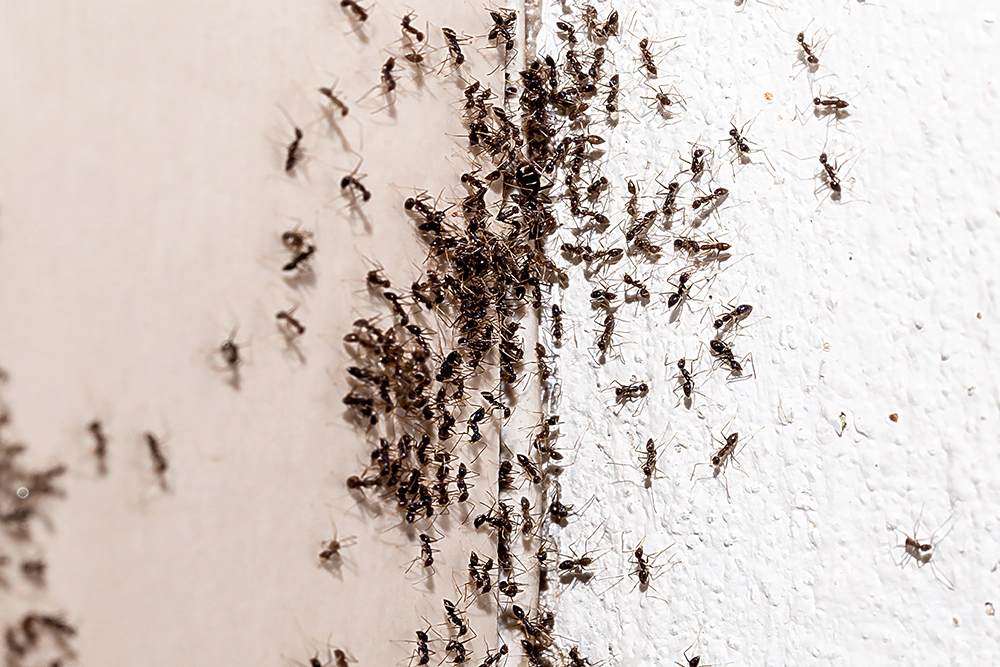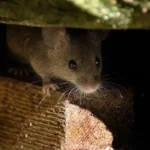
Ants are one of the most persistent household pests, and nearly every homeowner has dealt with them before. Once they locate a reliable food or water source, their colonies can quickly grow, sending more and more workers indoors. Professional pest control provides the most effective and lasting results, but there are several natural home remedies that may help control ant activity, and make your home less appealing to them.
These natural approaches can offer short-term relief, but they aren’t foolproof. Ants are highly adaptable and often find alternative routes. Combining these natural methods with proper sanitation and professional prevention strategies is what it takes to make a lasting difference.
Natural Ant Control Methods to Try
1. Vinegar Spray
White vinegar is a common household ingredient that doubles as a natural ant deterrent. Combine equal parts water and vinegar in a spray bottle, then apply it directly to visible ant trails and entry points. The scent removes their pheromone markers, which disrupts their ability to navigate.
2. Lemon Juice Spray
Lemon juice works in a similar way by masking the chemical trails ants use for communication. Apply pure lemon juice or a diluted spray to windowsills, doorways, and countertops to discourage ants from returning.
3. Sugar and Baking Soda Bait
A mixture of sugar and baking soda can help reduce small infestations. The sugar draws ants in, while the baking soda interferes with their digestive system. Place small amounts of the mixture in shallow containers where you’ve seen ant activity.
4. Diatomaceous Earth
Food-grade diatomaceous earth (DE) is a natural powder made from fossilized algae. When ants walk through it, the fine particles damage their exoskeletons and cause dehydration. Lightly dust DE around cracks, entry points, and along baseboards for safe and effective control. Always use food-grade DE to prevent harming your family and pets.
5. Essential Oils
Certain essential oils, such as peppermint, eucalyptus, and tea tree, are known for their ant-repelling properties. Mix a few drops of your chosen oil with water in a spray bottle and apply it around doors, vents, and other entry areas.
6. Cinnamon
Cinnamon has a strong aroma that ants dislike. You can sprinkle ground cinnamon along ant trails or leave cinnamon sticks in problematic areas. This natural method helps mask their scent trails and discourages them from moving closer.
7. Borax and Sugar
Borax, when combined with sugar, creates an effective homemade ant bait. Worker ants carry the mixture back to the colony and spread it to the others. Remember to use caution with borax, always keep it away from pets and children.
8. Used Coffee Grounds
Used coffee grounds can be repurposed to help deter ants. Spread them around outdoor foundations, garden beds, or entryways. The scent can mask pheromone trails and discourage ants from entering.
9. Cornmeal
Cornmeal works as a non-toxic way to manage ants. They’ll eat it and share it with the colony, but they can’t properly digest it, which helps reduce their numbers over time.
10. Soap and Water Spray
A mixture of dish soap and water is a quick solution for visible ants. The soapy film coats their bodies, breaking down their outer layer and leading to dehydration. Spray directly on ants or in areas where you see activity.
11. Clove Essential Oil
Clove oil is a potent ant repellent with a strong, lasting scent. Combine a few drops with water and apply to cracks, corners, and entry points where ants may hide or nest.
12. Chalk Lines
Drawing lines of chalk along windows, doors, and baseboards can interfere with the scent trails ants use to travel. While this isn’t a long-term solution, it can temporarily reduce activity in specific spots.
13. Repellent Plants
Some plants naturally repel ants with their aroma. Herbs like mint, basil, and lavender are good examples. Plant them around the home’s perimeter or near doorways to create a fragrant, natural barrier.
Professional, Long-Lasting Ant Control
While these natural methods can help reduce ant numbers and activity, they usually can’t eliminate an entire colony, especially if the nest is hidden behind walls or underground. For complete protection, professional pest control services are needed.
Our technicians use proven methods to locate nests, identify the species, and apply safe, targeted treatments. With expert help, you can stop infestations at their source and prevent them from coming back.
If you’ve tried natural remedies and ants continue to march into your home, contact our team today for reliable, long-term solutions.




